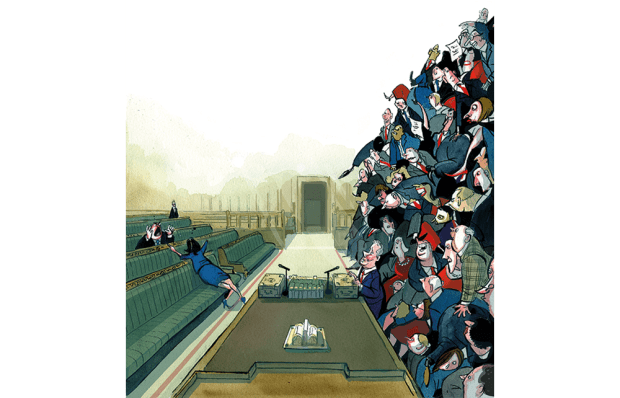Welcome changes
Sir: Lloyd Evans’s sympathetic piece on the fate of Afghans once they arrive in the UK made for sobering reading (‘New arrivals’, 18 December). In the Sulha Alliance we are endeavouring to support those Afghans and their families who served with and alongside British forces in Afghanistan. That is not the totality of Afghan migrants, but of the former interpreters and their families it can be truly said ‘they are here because we were there’ — and we owe them.
I will not go over the whole sorry saga of the UK’s mistreatment of this group, but we really need a step change in how they are looked after. As Mr Evans’s article makes plain, the Home Office default setting for supporting all migrants is ‘survival’: sufficient unto the day and not a penny more. For the former interpreters and their families, we demand a different standard: that they be given the means to thrive, not simply survive.
This does not necessarily mean significantly more spending. In many cases, it just needs the government to fulfil its own promises: to grant them Indefinite Leave to Remain, enabling them to access loans, long-term employment and tertiary education; and to establish the 300+ university scholarships promised in August. Many of the Afghans who served with us were among the brightest and best of that country, and I’m sure that our investment in them will pay a handsome dividend.
These aren’t new demands. These promises were made throughout last year but they haven’t been fulfilled. The government calls its plan Operation Warm Welcome; for rather too many this is proving ironic at best.
Simon Diggins OBE, Colonel (Retd)
DA Kabul, 2008-10
The Sulha Alliance
Chicken out
Sir: Peter Hitchens’s entertaining account of Christmas in Moscow (‘Red Christmas’, 18 December) brought back my own memories of spending Christmas there as a student in 1982. Neither geese nor turkeys were available in those days, and the scrawny chickens in the state shops were so battered and bruised that even we British students turned up our noses at them. Fortunately we had access to the British embassy shop, where we were allowed to spend £15 per month on various luxuries, including fresh meat imported from the UK and Finland. Since our hostel lacked a suitable fridge for the three large chickens we purchased, we placed them on the outside window ledge overnight. The next day we were dismayed to find they were frozen solid. A bath filled with warm water saved the day, although it turned out to be a late dinner rather than lunch.
Peter Shutak
Fleet, Hampshire
Picture of health
Sir: Dr Chaand Nagpaul protests too much when he writes of how under-resourced the NHS is (Letters, 18 December). The UK has more doctors per head than Luxembourg, the USA, Japan, Canada, South Korea or Poland, and only slightly fewer than Belgium. It’s true that we have one of the lowest numbers of hospital beds per capita in Europe, but that prompts two questions: what’s been done with the extra money the NHS has received while closing beds, and how is one to explain why Japan has six times as many beds per head as Sweden? The reality is that there’s no straightforward relationship between any of these measures — which vary hugely from one rich country to another — and health outcomes.
Andrew Anderson
Edinburgh
The Christian path
Sir: Tanjil Rashid claims that ‘worshippers of all religions are treading different paths up the same mountain’ (‘Common prayer’, 11 December). However, at the heart of Christianity lies the belief that God is not found by us choosing our own path to climb up to him; rather, God has chosen to come down to us and made himself known in the person of his Son, Jesus Christ. Edward Caswell expresses the wonder of the incarnation in his carol ‘See, Amid the Winter’s Snow’: ‘Sacred infant, all divine/ What a tender love was thine/ Thus to come from highest bliss/ Down to such a world as this.’ When we remember that the birth of Christ would one day lead to his death for this world’s redemption, then our response can only be: ‘O come, let us adore him!’
The Revd Dr James Torrens
Minister, Highland International Church, and Moderator of the International Presbyterian Church, Inverness
Mistletoe myths
Sir: Laura Freeman’s description of the history and properties of mistletoe (‘Notes on…’, 11 December) mentions that it ‘has long been thought to have… medicinal properties’. As a former oncologist I was aware of this, especially in my years in Australia, as many of my patients used an extract of this shrub, usually Iscador. A few even abandoned conventional anti-cancer treatments for this alternative approach. Mistletoe extracts, of which there are many, are probably the most commonly used anti-cancer oral and systemic intervention in many parts of Europe, especially Germany. The best summary I have seen on it is an editorial in the British Medical Journal
by Professor Edzard Ernst, which discusses the trials, their quality (or lack of it), the toxicity of this intervention, in vitro evidence and cost. In conclusion he recommends ‘mistletoe as a Christmas decoration and for kissing but not as an anti-cancer drug’ — something I wish some of my patients had been more aware of.
Dr Alan Rodger
Glasgow
A toast to Jeremy
Sir: Jeremy Clarke’s column (Low life, 18 December) made my Christmas. I toasted both his incorrigible humour and wonderful news regarding his chemotherapy. I hope he and his oncologist friend danced on the desk while drinking from the champagne bottle in his rucksack. Let the taxi wait!
Sue Alexander
Kaiapoi, New Zealand
Got something to add? Join the discussion and comment below.
Get 10 issues for just $10
Subscribe to The Spectator Australia today for the next 10 magazine issues, plus full online access, for just $10.
You might disagree with half of it, but you’ll enjoy reading all of it. Try your first month for free, then just $2 a week for the remainder of your first year.














Comments
Don't miss out
Join the conversation with other Spectator Australia readers. Subscribe to leave a comment.
SUBSCRIBEAlready a subscriber? Log in